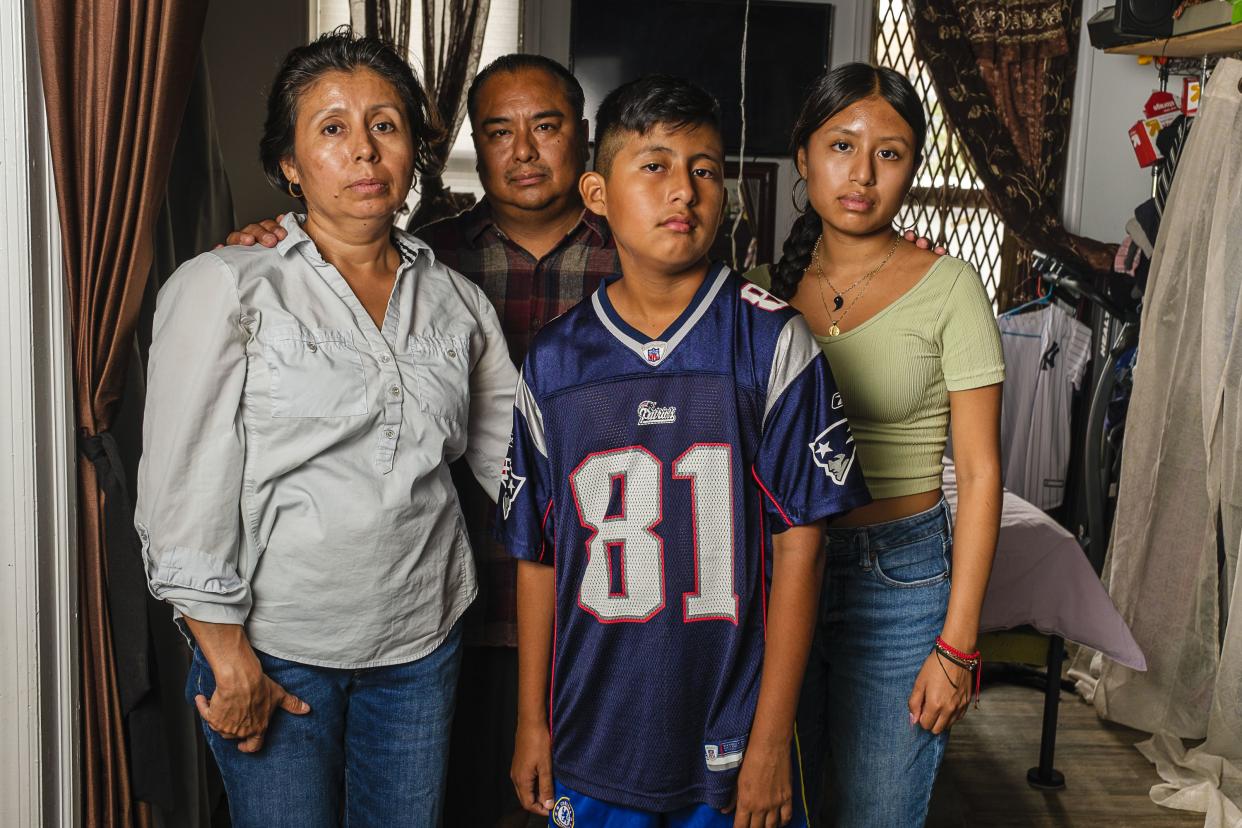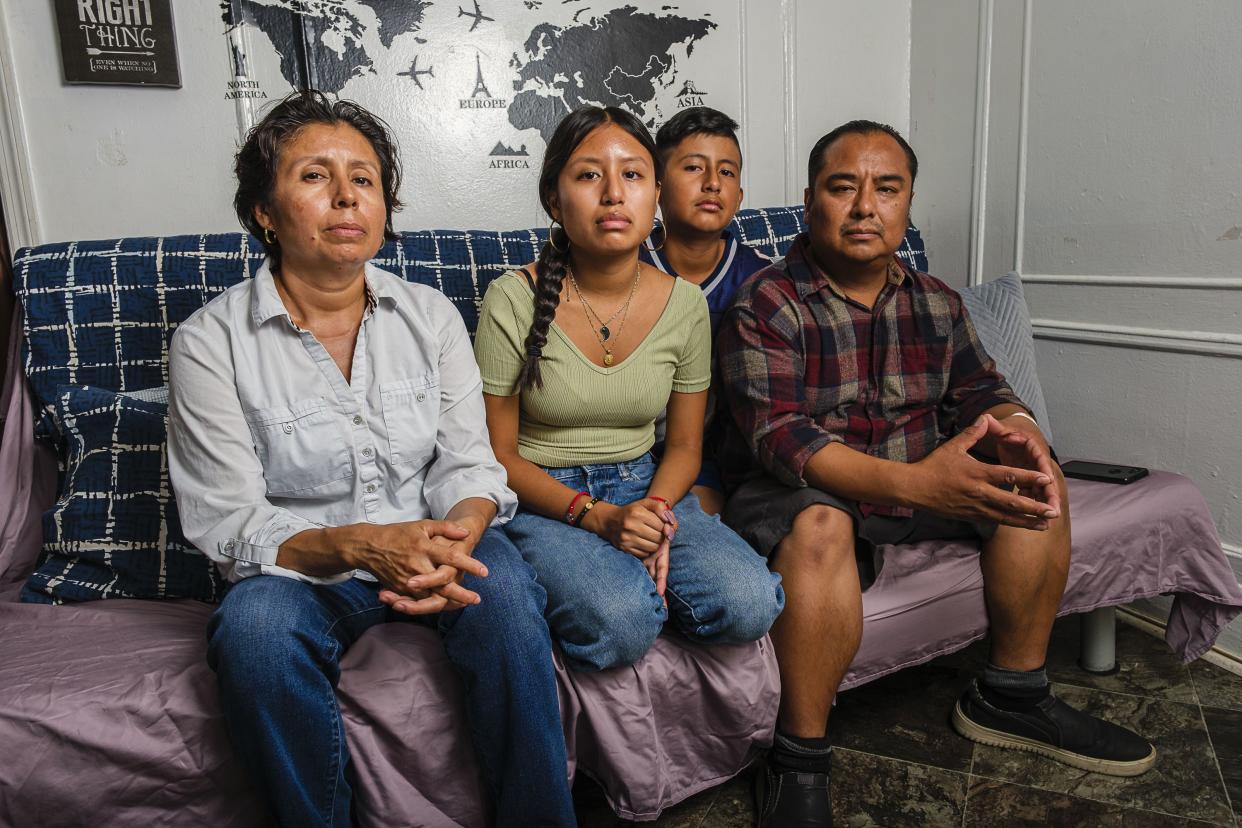Evictions increase post-pandemic. Thousands in NYC fear losing their homes, including this Brooklyn family
Between the walls of his modest two-bedroom apartment in Sunset Park, Fabian Bravo has watched his family grow.
He’s seen his three children go from infants to toddlers to teens. Pictures of his family, children’s drawings and kind notes from teachers and friends line the walls. This apartment, and the neighborhood along the bay in Brooklyn, are a source of comfort for him, the family’s home base from which they’ve explored the city.
But now — as eviction proceedings paused during the coronavirus pandemic resume in New York — Bravo’s biggest fear is losing that home. His landlord has taken him to court in a bid to oust Bravo from his rent-stabilized home.

Fabian Bravo and his family, kids Samantha, 17, and Nathan, 11, and wife Nora, are facing eviction from their Sunset Park home. (Jeff Bachner/)
Bravo is not alone. The resumption of evictions, combined with a housing shortage and soaring rents, threatens families across the city with the possible loss of housing. In August, 431 households were thrown out of their home in the city. Currently, there are more than 250,000 active eviction cases in the state, according to Right to Council NYC.
“We’re looking at a crisis of mass proportions,” said Joel Feingold, a co-founder of the Crown Heights Tenants Union.
The federal and state eviction moratoriums and pandemic relief programs kept some of the thorniest features of the housing system at bay during the pandemic. Now, as rents continue to increase, low-income New Yorkers, who disproportionately suffered during the pandemic, are at risk of getting hit once again
New York’s eviction moratorium expired Jan. 15, 2022. While the number of actual evictions is still below pre-pandemic levels, eviction filings have picked up, bringing them back to pre-pandemic levels, according to state court data. The slow and steady uptick has raised questions for advocates and policymakers about the overall affordability of life in New York.
Bravo and other New Yorkers are already struggling to get back on their feet after the financial impact of COVID-19. The return of evictions jeopardizes that — and threatens, in the more dire cases, to force people into homelessness and an already overburdened shelter system.
“There’s a community,” Bravo said. “I’m with my children, with my wife. I love it, because my children were born here. We’re close to the parks, to public transport, to the schools that are teaching my children ... There are a lot of memories here.”
Gas, rent — or food?
Bravo’s eviction case traces back to the early days of 2020 — just before the coronavirus pandemic swept into New York.
Bravo’s landlord alleged that he didn’t sign the lease renewal. Bravo says he has proof he did, and that the landlord is trying to get his family out in order to jack up prices. The neighborhood is seeing a sharp increase in interest, according to a recent StreetEasy report, with the average rent for a similar apartment is $2,300, nearly double Bravos’ monthly rent
Soon after it was filed, Bravo’s case was put on pause.
But as COVID tightened its grip on New York, the death toll climbed and businesses shuttered their doors, the family found itself sliding deeper into trouble. Bravo lost his job working in a warehouse and his wife lost hers as a housekeeper, leaving the family without income for months. At best, Bravo was able to scrape together odd jobs to make enough money to get by, forcing them to ask tough questions: Gas, rent or food?
“We were without jobs during the pandemic,” Bravo said, in Spanish. “Also, the kids were doing school virtually. At the same time, we were worried about the case, in calling, trying to contact the lawyer, but even the lawyer didn’t know what was going to happen, when the next hearing was going to be. We were constantly worried.”

From left to right: Nora Bravo, Nathan Bravo, Samantha Bravo and Fabian Bravo face eviction from their Sunset Park, Brooklyn home. (Jeff Bachner/)
The family changed their diet to include cheaper staples such as potatoes, and relied on food donations boxes from Neighbors Helping Neighbors, a local advocacy group. Bravo’s sister-in-law died from COVID-19 in May 2020, making the situation even more difficult to cope with.
Bravo said home life got chaotic, with kids with cabin-fever bouncing around the apartment as others tried to focus on virtual school.
“It was difficult to adapt, with the children at home, not seeing their friends,” Bravo. “My son is very active. He always wants to jump around and run ... I had been at home for those months and I saw that he got depressed ... emotionally, I had a lot of concern.”
During that time, the family also fell eight months behind in rent, stirring fear that the landlord would layer a nonpayment case on top of the lease issue.
Navigating the system
Bravo fears he may lose his case — and has no idea where he and his family would go.
“It is complicated because we would have to look for another apartment far from where we live. Apartments today in this area where we live are between $2,000 and $3,000 a month. To pay the rental deposit and the rent, I’d have to have about $9,000 on hand.”
Like thousands of others in his situation, Bravo is trying to navigate a complicated legal system without help.
Under the 2017 Right To Counsel law that established a legal right to an attorney for tenants with incomes under 200 percent of the state’s poverty line when facing eviction, Bravo should have legal representation.
But staffing shortages and a rising wave of evictions have placed him on a very long line of tenants in similar positions.
Ever since January, the escalating number of cases has overwhelmed the tenant attorneys who provide counsel to tenants. There are more tenants who need representation, and, with an ongoing attorney shortage, fewer people to represent them. Even though tenants have a legal right to representation, it can be extremely difficult to get it.
Pressure from well-represented landlords and courts eager to move the backlog of cases along means that tenants like Bravo can be pressured to accept bad deals.
“I think possibly the owner will win the case and evict us,” Bravo said. “So if there are no attorneys to represent tenants like me, I would have to personally face the cost. And the owner has money and she can get a lawyer to represent her. She has a huge advantage as the owner of the building.”
An uncertain future
Bravo anxiously watches the mail for any official notices or updates. The family doesn’t know where they’ll go if they get kicked out.
Even in a best-case scenario, they’d have to pack their things and rip themselves from their community. Bravo is used to the stress: He’s been dealing with the case for more than two years. But he wonders if he’ll ever get legal representation, and his heart skips every time a letter arrives in the mail.
“Financially, we’re still not in a good place,” he said. “Obviously, there is a concern that we will be evicted from the apartment, and without any reason.”
His daughter is starting college — an opportunity neither he never had. But she doesn’t know if she’ll be able to stay in school if the family gets evicted.
“It’s very insecure,” Bravo said. “My daughter is thinking about the first day of school, but she’s worried if she’s going to be able to continue because we couldn’t be able to afford for her to continue in school. If we had to move out, we’d have to pay for any increases, so we’re not sure. That’s constantly on our minds, our children’s, thinking about this decision.”
